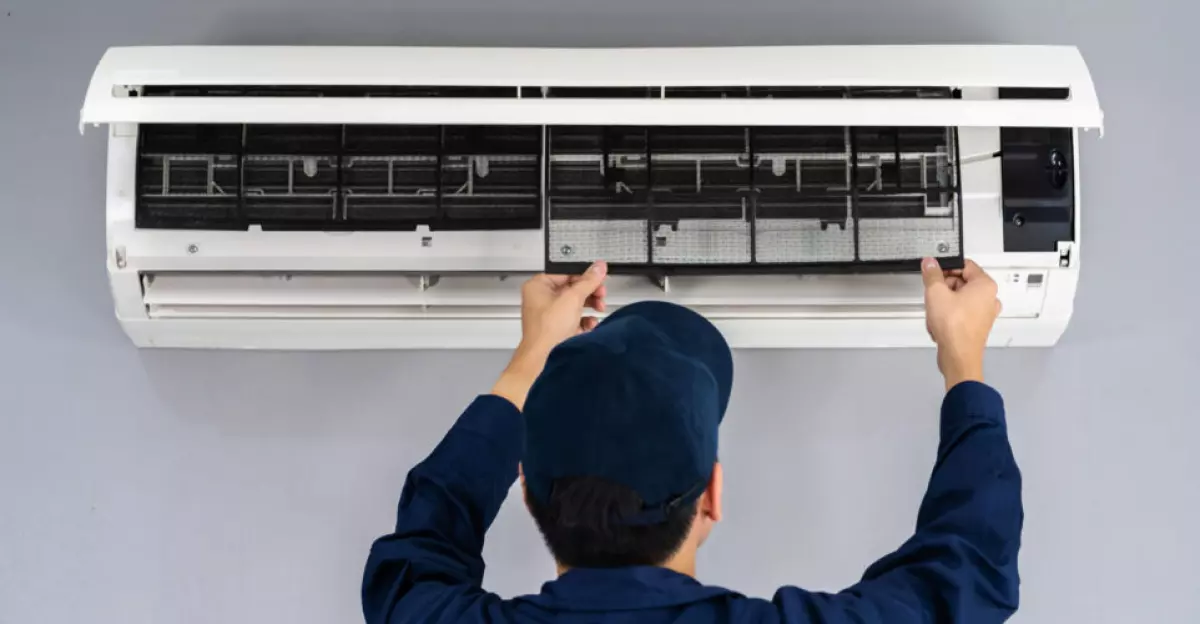 Image source: Sanaulac
Image source: Sanaulac
If your HVAC system or air conditioner unit is not working as it should, it may be time for some maintenance. In this article, we will guide you on how to properly maintain your air conditioner with simple DIY methods, clean individual components of your system, and know when it's time to call in the experts.
1. Power Off and Clear Debris
To begin cleaning your air conditioner, the first step is to turn off the power and unplug the unit. Take the time to let the system cool down before proceeding. Once it has cooled, open the outdoor unit and clear any debris from the condenser fins. Make sure to remove leaves and other obstructions.
2. Clean and Replace Your AC Filters
Regularly cleaning and replacing your AC filters is essential for efficient and clean air conditioning. Depending on your circumstances, you may need to replace the filters more frequently. Follow these steps to clean your AC filters:
- Remove the filter from the unit.
- Use a dry cloth or a vacuum to remove dust and debris.
- Scrub the filter with a diluted detergent and water solution.
- Rinse the filter thoroughly and allow it to dry completely before reinserting it into the HVAC system.
3. Check and Clean the Evaporator and Condenser Coils
The evaporator and condenser coils are critical components of your air conditioner. They need to be kept clean and free from dust and debris to ensure optimal performance. Check these coils at least once a year and clean them using a soft bristle brush, AC solvent, or mild detergent. Allow them to dry completely before reinstalling them.
4. Straighten Coil Fins
Coil fins are responsible for removing warm air from the system. If you notice any bent fins on the outdoor AC unit, you can easily straighten them:
- Remove the panel to access the fins.
- Determine the appropriate fin comb head.
- Spray a mild dish soap on the bent fins to lubricate them.
- Starting from the bottom, gently straighten the fins using the fin comb.
5. Unclog Drain Channels
The condensate drain line in your air conditioner can become clogged with dirt and debris over time. This can lead to flooding and damage to your home. To prevent this, follow these steps to clean the drain channels:
- Remove and clean the drain pan under your evaporator coils.
- Connect a wet/dry vacuum to the drain line and clear away any debris.
- Flush the line with water using a garden hose to ensure it is completely clear.
- To remove any remaining buildup, pour a mixture of warm water and white vinegar down the line.
6. Ensure Proper Airflow
Proper airflow is crucial for your air conditioner to function efficiently. Check your ductwork for any obstructions, leaks, or crimps that may restrict the airflow. Additionally, make sure there are no outdoor heating and air conditioning equipment blocking the airflow or closed/blocked vents inside your home. Keeping your equipment clean is also important for maintaining proper airflow.
7. Level the Condenser Unit
An unbalanced or lopsided condenser unit can cause problems with refrigerant flow and fan motor longevity. To level your AC unit:
- For units on a concrete slab, add gravel underneath the sinking part.
- For units with adjustable legs, loosen the screws, adjust as necessary, and tighten them.
- Temporarily shimmy a piece of wood under the sinking part while you arrange professional help.
Remember to tackle HVAC maintenance tasks only if you have the necessary tools and experience. Otherwise, it's best to seek professional assistance.
When to Call a Professional
While regular maintenance can be done by homeowners, certain situations call for professional help:
- Mold: If you notice mold in your system, contact an HVAC technician to safely address it.
- No air: Your unit should blow air even if it's hot. If it doesn't, it may need a new part.
- Noise: Unusual or loud noises are signs that your HVAC system requires repair.
- Odors: Strong odors, such as smoke or musty smells, should be inspected by a professional.
- Warm air: If your unit continues to blow warm air after performing DIY maintenance, it's time to contact the professionals.
Room Air Conditioners
For window air conditioner units, follow these maintenance tips:
- Clean air filters, coils, and the drain pan every spring.
- Seal any gaps between the unit and window frame for improved cooling.
- Store the unit properly during the offseason by either covering it or removing it.
Our Recommendation
Regularly cleaning and maintaining your air conditioner improves energy efficiency, extends its lifespan, and ensures effective cooling. If you have the necessary experience, you can handle HVAC maintenance yourself. However, if you are unsure or uncomfortable, it is best to contact a professional.

















